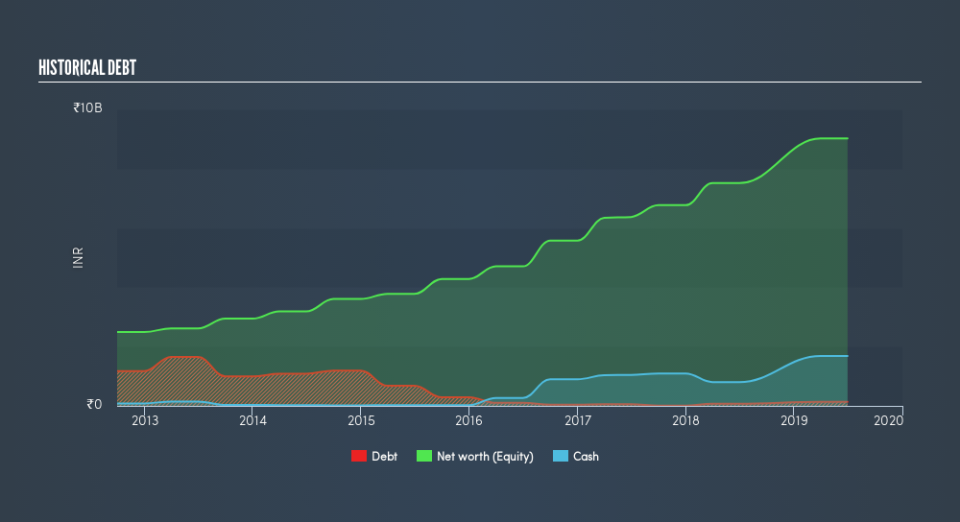V-Guard Industries (NSE:VGUARD) Has A Pretty Healthy Balance Sheet

Howard Marks put it nicely when he said that, rather than worrying about share price volatility, 'The possibility of permanent loss is the risk I worry about... and every practical investor I know worries about.' So it seems the smart money knows that debt - which is usually involved in bankruptcies - is a very important factor, when you assess how risky a company is. We can see that V-Guard Industries Limited (NSE:VGUARD) does use debt in its business. But should shareholders be worried about its use of debt?
When Is Debt Dangerous?
Generally speaking, debt only becomes a real problem when a company can't easily pay it off, either by raising capital or with its own cash flow. Part and parcel of capitalism is the process of 'creative destruction' where failed businesses are mercilessly liquidated by their bankers. However, a more frequent (but still costly) occurrence is where a company must issue shares at bargain-basement prices, permanently diluting shareholders, just to shore up its balance sheet. Of course, debt can be an important tool in businesses, particularly capital heavy businesses. The first thing to do when considering how much debt a business uses is to look at its cash and debt together.
Check out our latest analysis for V-Guard Industries
What Is V-Guard Industries's Net Debt?
You can click the graphic below for the historical numbers, but it shows that as of March 2019 V-Guard Industries had ₹141.2m of debt, an increase on ₹71.9m, over one year. But on the other hand it also has ₹1.68b in cash, leading to a ₹1.54b net cash position.
A Look At V-Guard Industries's Liabilities
The latest balance sheet data shows that V-Guard Industries had liabilities of ₹4.55b due within a year, and liabilities of ₹177.7m falling due after that. Offsetting this, it had ₹1.68b in cash and ₹4.76b in receivables that were due within 12 months. So it can boast ₹1.72b more liquid assets than total liabilities.
This state of affairs indicates that V-Guard Industries's balance sheet looks quite solid, as its total liabilities are just about equal to its liquid assets. So it's very unlikely that the ₹97.0b company is short on cash, but still worth keeping an eye on the balance sheet. Succinctly put, V-Guard Industries boasts net cash, so it's fair to say it does not have a heavy debt load!
Another good sign is that V-Guard Industries has been able to increase its EBIT by 22% in twelve months, making it easier to pay down debt. When analysing debt levels, the balance sheet is the obvious place to start. But it is future earnings, more than anything, that will determine V-Guard Industries's ability to maintain a healthy balance sheet going forward. So if you're focused on the future you can check out this free report showing analyst profit forecasts.
Finally, while the tax-man may adore accounting profits, lenders only accept cold hard cash. V-Guard Industries may have net cash on the balance sheet, but it is still interesting to look at how well the business converts its earnings before interest and tax (EBIT) to free cash flow, because that will influence both its need for, and its capacity to manage debt. Looking at the most recent three years, V-Guard Industries recorded free cash flow of 35% of its EBIT, which is weaker than we'd expect. That's not great, when it comes to paying down debt.
Summing up
While it is always sensible to investigate a company's debt, in this case V-Guard Industries has ₹1.5b in net cash and a decent-looking balance sheet. And it impressed us with its EBIT growth of 22% over the last year. So we don't think V-Guard Industries's use of debt is risky. Of course, we wouldn't say no to the extra confidence that we'd gain if we knew that V-Guard Industries insiders have been buying shares: if you're on the same wavelength, you can find out if insiders are buying by clicking this link.
If, after all that, you're more interested in a fast growing company with a rock-solid balance sheet, then check out our list of net cash growth stocks without delay.
We aim to bring you long-term focused research analysis driven by fundamental data. Note that our analysis may not factor in the latest price-sensitive company announcements or qualitative material.
If you spot an error that warrants correction, please contact the editor at editorial-team@simplywallst.com. This article by Simply Wall St is general in nature. It does not constitute a recommendation to buy or sell any stock, and does not take account of your objectives, or your financial situation. Simply Wall St has no position in the stocks mentioned. Thank you for reading.

 generic
generic 
